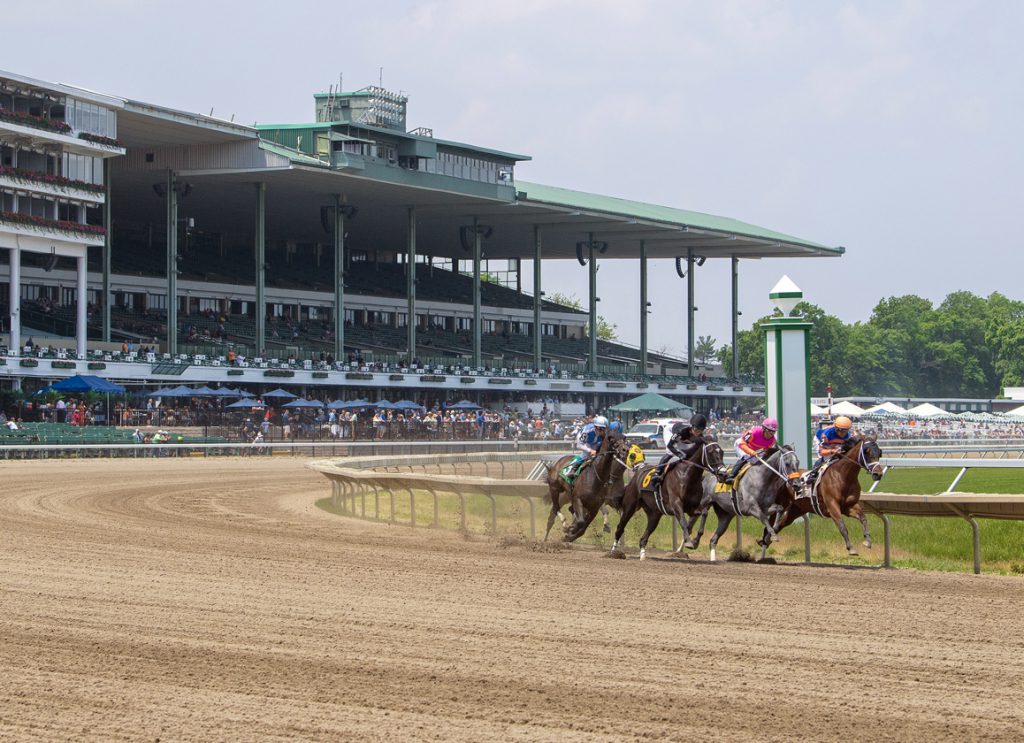By Bill Finley
Attorney Drew Mollica understands that his client trainer Doug Nunn violated Horseracing Integrity and Safety Authority (HISA) Rule 3313, which prohibits trainers from running a horse within 14 days of an intra-articular joint injection or working them within seven days of the injection. What he doesn't understand is why his client has been suspended while at least 15 other trainers have been let off the hook for the same violation.
“This is the height of hypocrisy,” Mollica said. “He has been victimized by a system that is flawed.”
On June 26, HISA announced that it had temporarily suspended full enforcement of its intra-articular joint infection rules and that the rule covering workouts would not go into effect until July 15. According to HISA Chief Executive Lisa Lazarus, between 15 and 20 trainers had breached the rule surrounding intra-articular joint injections prior to a workout. Lazarus said the delay in implementing the rule was needed because there was confusion among trainers regarding the specifics of the rule.
“On the workout side, while it was mentioned in the education process, it seems that a lot of trainers just really didn't understand it, and most of the violations we saw were only off by one day,” she said. She added that the temporary modification of enforcement of the rules was deemed the most “fair and equitable” way to proceed “given the number of violations.”
Alexa Ravit, the director of communications and outreach for the Horseracing Integrity and Welfare Unit (HIWU), confirmed in an email to the TDN that Nunn's penalty was not excused because the injection was too close to a race while the other offenders were too close to a workout.
According to Mollica, the horse in question, Smithwick's Spice (Frost Giant), was injected 12 days before racing on June 9 in an allowance race at Delaware Park, which the gelding won by three-quarters of a length. That, he argued, is less egregious than working a horse within seven days of an injection.
“The people who made the mistake of working within seven days put more stress on their horses than he did in the 12 days between the injection and racing,” he said. “The racing-versus-the-work argument is not logical because his horse had more time to recover.”
Mollica also said that if HISA had been doing its job the entry of the horse would not have been allowed.
“Doug Nunn's horse had an injection and it was reported on the horse's portal on May 31,” he said. “Everyone knew about it. HISA was supposed to now flag his entry. The horse was supposed to be ineligible to race. But they, maybe because of confusion, didn't do it. Doug Nunn was confused about the rules and didn't talk to his vet and didn't coordinate things properly. He entered the horse. The overnight was out eight days before the race. HISA never said 'Wait a minute, Doug, your horse isn't eligible.' They let him run on June 9. He wins on June 9. There was confusion as to what he was supposed to do. But Doug Nunn, as opposed to, fill in the blanks, the trainers who they let off, was treated differently. Those guys got a pass. That's not America to me.”
Mollica said that if possible confusion about the rules was the reason why trainers who violated the workout provision of the rule weren't suspended then there's no reason why the same argument shouldn't apply to racing a horse in violation of the rule.
“In this situation, there obviously was confusion,” he said. “How do I know? Because HISA themselves dropped the ball. Delaware Park was confused. HISA was confused. Doug was confused. Why is his any confusion any different than their confusion?”
Mollica also wants to know what trainers violated the workout rule. Although any possible suspensions were waived, their horses were ineligible to race within 30 days of the injection, which Mollica, argues, should make the names of those horses a matter of public record. He pointed to the June 29 story in the TDN in which Lazarus implied that the names of those horses would be released.
“When horses are suspended, you'll be able to figure that out,” Lazarus said at the time, pointing to HIWU's “public disclosures” webpage.
However, the names have not been disclosed and a request to HIWU by the TDN to release the names of the horses involved was denied.
“Since the trainers were not Provisionally Suspended and Charge Letters were not issued to them because they only received a warning (as per HISA's notice), HIWU will not be publishing the names of the horses currently facing a 30-day period of Ineligibility due to breezing too soon after an IA injection,” Ravit wrote to the TDN in an e-mail. “For IA-related matters after July 15, the names of both the trainers and the horses will be published once a Charge Letter is issued to the trainer.”
But HISA's own rule 3620 makes it clear that public disclosure is required. It reads: Rule 3620. Public Disclosure
(a) The Agency shall Publicly Disclose the resolution of an alleged violation of the Protocol no later than 20 calendar days after:
(1) the final decision;
(2) a resolution between the Agency and the Covered Person; or
(3) the withdrawal of a charge or a final decision finding of no violation
Why won't HISA/HIWU release the names of the horses that worked within the seven-day period, even though their own rules say they must? Mollica said he didn't want to speculate but he was quick to fault them for a lack of transparency.
“My problem is the lack of transparency and the lack of fairness,” he said. “What's good for the rich and famous trainers should be good for Doug Nunn. The lack of transparency shows because Lisa Lazarus said you'll know the names of those trainers when we publish the names of the suspended horses. Now we understand they are not going to release the names of those horses. Meanwhile, Doug was publicly villainized with his ruling up there on their website, yet we don't even know who these people who were given a pass are. So tell us. Transparency is the greatest disinfectant. We obviously have an infection. Why are we not disinfecting it?”
Nunn's violation can yield a suspension of up to 60 days but Mollica said he has reached an agreement with HISA and HIWU and that his client will receive a 30-day suspension. The situation has left him asking a lot of questions and he doesn't have all the answers, but he believes that Nunn was treated differently because he's a small-time trainer. Based at Monmouth Park, he's won six races this year from 59 starters and has 305 career victories.
“If you are going to start opening up loopholes, you can't open up loopholes for some and not for others,” Mollica said. “Doug Nunn is a victim of being a small guy in a big world. I do think he's being treated differently, like a lot of little guys are. This is stacked against the little guy. They excoriated Nunn and let others off and they won't even tell us who they are.”
Not a subscriber? Click here to sign up for the daily PDF or alerts.








